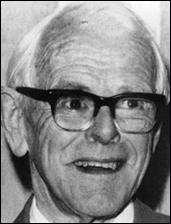Denis P. Burkitt, MD
1911 — 1993

Denis Burkitt, a missionary-type British government surgeon working in Africa, is a part of the epidemiology of CVD and non-communicable diseases for two main reasons: he elaborated a theory of prevention of “Western diseases” based on native nutrition and high-fiber diets, and he developed the epidemiology of the tumor named for him, Burkitt’s Lymphoma. The latter stimulated a whole area of work on viral carcinogenesis and established the first clear connection of a virus (Epstein-Barr virus) and a tumor.
Burkitt was educated at Trinity College, Dublin, and switched from engineering to medicine, it is said by his biographer, because of his religious conversion. With colleagues Hugh Trowell and Alex Walker he became a “shoe-leather epidemiologist” and toured equatorial Africa in a Land Rover mapping the distribution of a common but unusual multifocal childhood tumor. It was eventually shown to be due to the EB virus in populations with immune susceptibility due to malarial infestation.
I was privileged to attend in 1955 one of his famous lectures, given world-wide, in which he showed slides of the stools of natives living in the bush, their copious mounds resembling the fiber-filled leavings of ungulates, contrasted with the rabbit-like pellets characteristic of constipated British colonials on high-fat regimens. He associated fiber, in a simplistic thesis, with the absence of circulatory and intestinal diseases, and thereafter came to be called, “the bran man.”
Burkitt was an eminently quotable character. A remark he made at the Franklin Institute Seminar in his honor in 1993 is my favorite, not disparaging the study of mechanisms but emphasizing the importance of pragmatic approached to the obvious: “We need more simple questions and more simple research.” (HB)
Sources
Ferguson, A. 1993. ‘D.P. Burkitt [obituary]’. British Medical Journal. 306, 996.